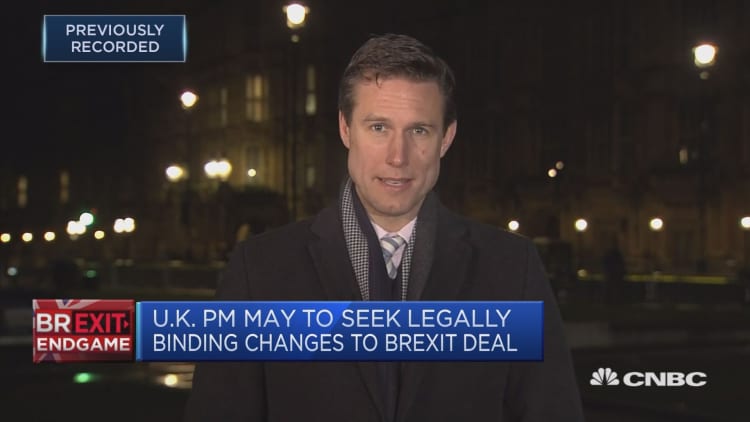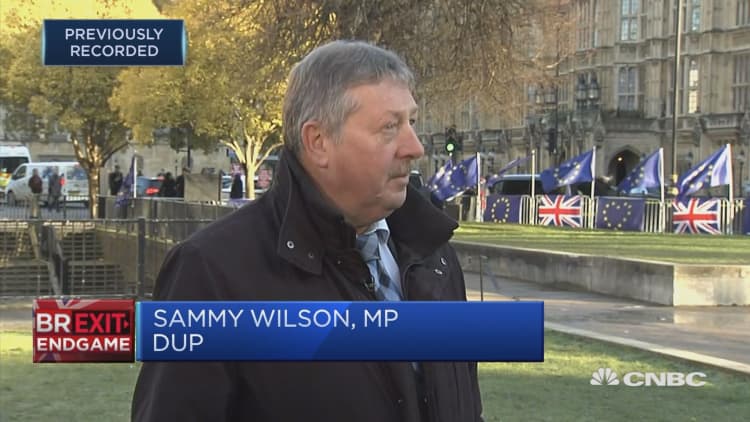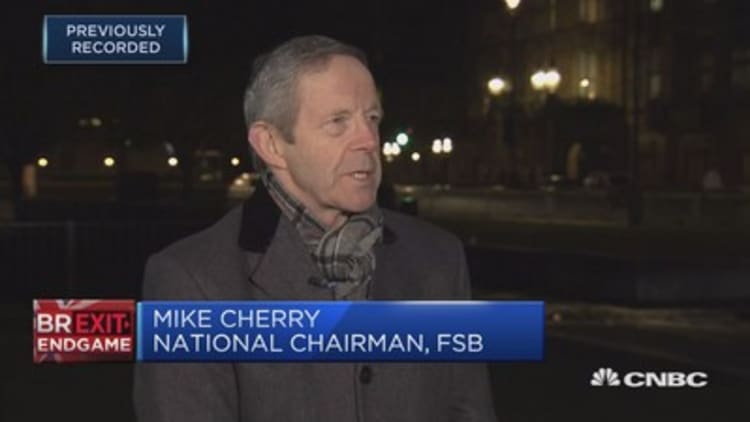U.K. Prime Minister Theresa May faces the unenviable task of reopening Brexit talks with Brussels, after lawmakers in Westminster backed a proposal for her to renegotiate the current deal.
She is due to return to her European counterparts in the next couple of days to renegotiate a controversial part of the Brexit deal she struck with them.
However, the EU has already told Britain it will only look at the deal again if the U.K. "evolves" its stance on a future relationship with the bloc.
A 'moment of theater'
In January, the majority of the U.K. Parliament rejected the original Brexit deal, also known as the "Withdrawal Agreement." But on Tuesday evening, MPs (Members of Parliament) voted on seven amendments that had been tabled by lawmakers in an effort to change the course of Brexit.
MPs passed two amendments, including one which sought to replace the controversial "Irish backstop" with unspecified "alternative arrangements."

This backstop is something of an insurance policy in the event of the U.K. and EU failing to agree a trade deal in a 21-month transition period (which itself only happens if there is a withdrawal agreement) after Brexit. It's designed to prevent a "hard" border on the island of Ireland, and could mean Northern Ireland (which is part of the U.K.) remained closely aligned to EU rules for an indefinite period, an unpalatable prospect rejected by many politicians.
MPs also supported an amendment that states the U.K. will not leave the EU without a deal although the departure date remains the same, and the vote is not legally binding.
May said after the votes that she would return to Brussels to see if she can persuade the EU to amend the backstop part of the deal — something that both she and the EU have previously ruled out.
There has been criticism that the U.K. is just wasting precious time as the departure date draws near. Gabriel Felbermayr, the director of the Ifo Center for International Economics at the Ifo Institute, told CNBC that the votes Tuesday evening had done little to change the situation.
"We had this moment of theater again yesterday in the (House of) Commons and it was very entertaining to watch, but not very enlightening at all. We've heard the relatively negative responses out of Brussels — they are not going to renegotiate the Withdrawal Agreement — and we did not see what exactly the British Parliament really wants," he told CNBC's "Capital Connection."
"They want a technical solution to make the border in Ireland soft but what this could be is not clear so we're still at a loss. Of course, we need a compromise to make this deal possible and to avoid both sides losing economically … We do not have any further information that could calm our nerves that has come out of the British parliament yesterday."

No negotiations?
The EU has shown little appetite for renegotiating its original deal. After the parliamentary votes Tuesday evening, a spokesman for European Council President Donald Tusk said the EU welcomes the U.K.'s "ambition to avoid a no-deal scenario" but said "the backstop is part of the Withdrawal Agreement, and the Withdrawal Agreement is not open for renegotiation."
However, it was suggested the EU could shift its position "if the U.K.'s intentions for the future partnership were to evolve."
"The EU would be prepared to reconsider its offer and adjust the content and the level of ambition of the political declaration," the statement said, also reiterating that the EU would consider any "reasoned request" for an extension to the departure date.
French President Emmanuel Macron said the current deal on offer is the "best possible" and "not negotiable" and the Irish government rejected any renegotiation of the backstop. Ireland's Deputy Prime Minister Simon Coveney tweeted that it was a "necessary" insurance policy.
Stay away from sterling
Sterling fell 0.6 percent to $1.307 Tuesday evening after one of the amendments put before Parliament — which proposed to give the government more time to reach an agreement with the EU — was defeated. The Cooper amendment (named after the MP that tabled it) would have pushed the departure date to December 2019, lowering the chances of a no-deal Brexit.

Beat Whitman, partner at Porta Advisors, told CNBC that investors should stay away from sterling and U.K. assets.
"I would continue to recommend to stay away from U.K. assets overall because any political prediction has been impossible here and my best guess is that this can will be kicked down the road further," he told CNBC's "Capital Connection."
"There's time to go before the end of March then there will be some prolongation potentially and the EU will be constructive on that one, but then of course the U.K. government has to come up with a plan, not like yesterday's vote, but some material change."


